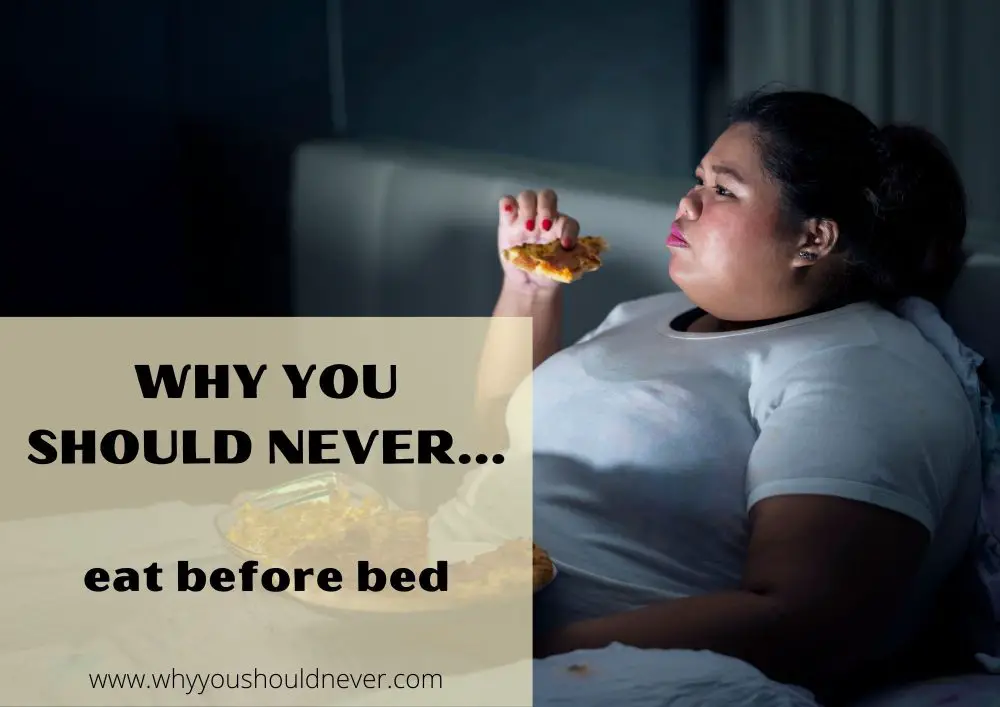![]()
Why You Should Never Eat Before Bed
When hunger strikes before bedtime, it’s tempting to just grab a quick snack and call it a night. No harm done, right?
Well, not quite. While it may not seem like a big deal to eat before bed, it can actually have some pretty serious consequences for your health. In this article, we’ll explore what some of those are.
8 reasons why you shouldn’t eat before bed
1. You’re more likely to gain weight
Eating late at night can cause you to gain weight. This is because your metabolism slows down when you sleep, so your body can’t burn off the calories as efficiently.
When you eat right before bed, you’re more likely to end up storing those calories as fat. So, if you’re trying to lose or maintain a healthy weight, it’s best to avoid eating late at night.
2. You might have trouble sleeping
If you eat right before bed, you might have trouble falling asleep. This is because your body is busy trying to digest food instead of resting.
What’s more, your body temperature rises when you eat, which can also make it harder to sleep.
Trouble sleeping will, inevitably, lead to feeling tired the next day. And that can make it hard to focus on work or school.
3. You could get indigestion
Eating close to bedtime can also cause indigestion or heartburn because your stomach is working overtime to digest the food.
This occurs when stomach acid comes back up into your esophagus (the tube that connects your throat to your stomach). When this happens, you might experience symptoms like chest pain, a sour taste in your mouth, or trouble swallowing.
4. It’s not great for your teeth
Most people tend to brush their teeth before going to sleep, but if you’re not in the habit of doing so, and even if you are, eating before bed can cause plaque to build up on your teeth overnight. This can then lead to cavities or gum disease.
5. You’ll have bad breath in the morning
When you sleep, your saliva production decreases which can cause bacteria to build up in your mouth and lead to bad breath in the morning. Eating right before bed will only make this problem worse, as the food you eat will add to the bacteria in your mouth.
6. It can raise your blood sugar levels
If you have diabetes or are at risk of developing it, eating before bed can be a problem. This is because when you eat, your blood sugar levels rise.
And if you eat foods with a lot of carbs, your blood sugar levels can stay elevated throughout the night. This can lead to serious health problems like diabetic ketoacidosis (a dangerous condition that can happen when blood sugar levels get too high).
7. You’ll feel lethargic and sluggish
Going to sleep on a full stomach, particularly one full of high-carb foods, can make you feel lethargic and sluggish. You’ll be uncomfortable, and you’ll likely be able to feel the food sitting in your stomach as you try to sleep.
8. You could have nightmares
While there’s no scientific evidence to support this, some people believe that eating certain types of food before bed can cause nightmares. Cheese and spicy foods are two examples of foods that are said to cause nightmares.
One theory is that the increased blood flow to your digestive system when you eat can lead to strange dreams.
So when should you stop eating for the day?
Ideally, you should stop eating 2-3 hours before bedtime. This will give your body time to digest the food and avoid any of the problems we’ve discussed.
Not eating after 7 pm: is it really that important?
While no hard and fast rule says that 7 pm should be the cut-off point, it’s a good general guideline. This is because it takes about 3 hours for your body to digest a light meal, and 7 pm is usually around the time when people start to wind down for the day.
If you must eat late at night, try to stick to light, easily-digestible foods like soup or fruit, and make sure that you brush your teeth afterward.
